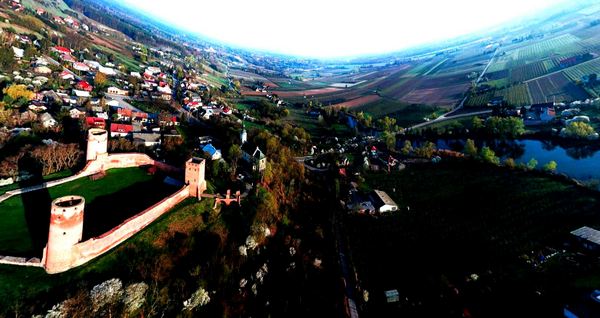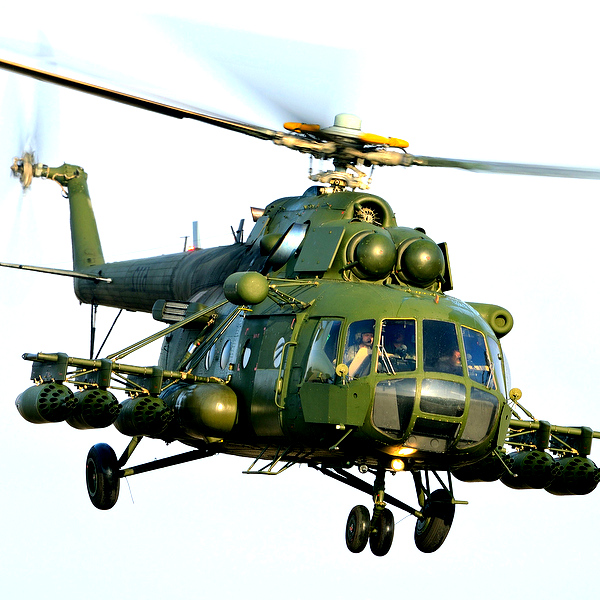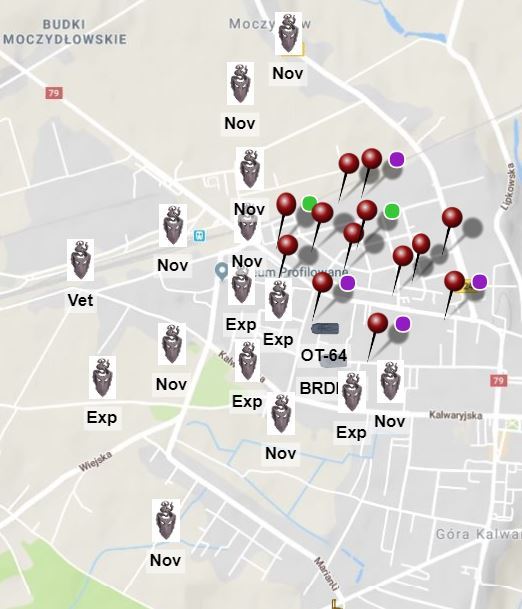27 September 2000. Góra Kalwaria, Poland.
In the morning, the civilians posted on the east side of the river reported a large band – “dozens” – of troops marching on foot toward the bridge over the Vistula. The townsfolk retreated back over the bridge.
It wasn’t long before a lone UAZ-469, sporting a white flag, rolled over the bridge. It came to a stop halfway, and waited patiently. Maks, observing from the Czerk castle tower, asked for a volunteer to take a radio out to the new arrival.

By radio, Maks and the man spoke in Polish. Maks declined to identify himself over the radio, but he did learn the officer’s name, Maj. Anatol Wilk. They’d been “acquainted” years ago, in the early days of the war.
Emissary: Maj. Anatol Wilk. Pulled cards for motivations. Wild Card [I decided that this meant Maks knew him in the past]; 10 of Clubs (Very Violent).
Bland-looking fellow with Coke-bottle glasses. Formerly of Polish military intelligence. Was investigating Maks in the months leading up to his defection, including two interrogations, the second of which turned violent. Competent. Little known about him. Has acquired a prosthetic arm since Maks saw him last.
Wilk spoke without animosity. The Baron Czarny was impressed with this unknown group’s fighting ability in the clash with the Korsarz yesterday, wants them to join his army as a free company. Perhaps serve as security force for Góra Kalwaria? Pay is good, and good service is rewarded.
Maks demurred, said he’d think about it.
Wilk: “I need an answer now.”
Maks: “Then the answer is No.”
Wilk: “So be it.”
Maks: “Before you leave, I have something to show you.” The civilian runner shows a photo of the “Reset device” – the nuclear demolition charge that had been bargained to Kraków – to Wilk. Maks, over the radio, implied it was secreted near the Baron’s holdings in Warsaw.
Major Wilk had the UAZ turn around, and left without comment.
The remainder of the day passed without incident. The barge was winched out of the river. It was in poor shape; one whole side had been torn open by explosions and holed by large-caliber rounds. Some of their gear had spilled out, and was at the bottom of the river. The rest was soaked.
No longer needed for salvage, the tug Wisla Krolowa was sent upriver, out of harm’s way. Should events go poorly in Góra Kalwaria – Maks ordered – Elizka was to continue back to Sandomierz or even Kraków.
28 September 2000
The new day dawned. Maks felt this would be the day.
Volkhov had radioed yesterday from Niepołomice (boosted by a repeater in Sandomierz) that his boat with militia reinforcements was on schedule to arrive this day, in the afternoon. Volkhov had also hinted he was working on other angles, but couldn’t promise anything at the time of the communication.
It was too late. By mid morning, it was clear that the Baron’s offensive was in motion. Troops were spotted taking positions along the east bank of the Vistula.
The Korsarz returned, but they were cautious, motoring upriver slowly, remaining downriver of bridge this time. The menacing-looking torpedo boat was among the smaller pirate boats.
More disturbingly, a squad of the Baron’s forces stumbled into a watchpost of GK civilians… on the west side of town.
The torpedo boat blasted its nautical horn three times. It could be heard for miles around. It was the attack signal.
Maks, in the command post at the castle, received the reports from his spotters with increasing dismay. It was clear that the enemy numbered between 200 to 300. His coalition was outnumbered by a large margin.

Obviously, this was going to be a big fight, the largest we’ve conducted. Before the session, I’d devised a quick-n-dirty mass combat system:
Baron’s units. 10-man squads
3 attacks each troop; (roughly) Impossible difficulty, as follows
Novice 1-2 (d20)
Exp 1-3
Vet 1-4GK militia. 5-man squads
2 attacks each person; Formidable difficulty (home ground advantage)
All are Novice, hit on 1-4 (d20)No hit point tracking. Each hit has a 50% chance of disabling that troop, otherwise it’s still in the fight.
A squad will retreat when over 50% casualties.Once in city core, the militia is harder to hit due to home ground defensive advantage, and urban cover (20% chance to suffer loss, not 50%).
The Baron’s forces across the river began advancing across the bridge. But Maks had prepared earlier, laying obstacles, claymore mines, traps. Their progress was slow and painful.
The outermost town militia pickets, in the north and west outskirts of town began taking losses, retreating back into town.
The Korsarz motored slowly upriver. Maks presumed they’d shell the town again with their mortars and support the bridge crossing.
Civilians in retreat were now taking harrowing losses withdrawing into the city core. Maks was monitoring the radio, and the designated frequency was jammed with shouting and despairing civilian comms. Another frequency, now that their radio silence was broken, had coded communications between the opposition.
Maks, seeing a rout in the making, began leaning toward evacuation, and abandoning the town.
On another frequency, Maks got a radio call in English. The man was a Captain Riggs, US Army, 5th Division. He claimed he had 20 Americans only minutes out, requesting location for a drop…
By air!

Then Maks saw it. A Mi-17 Hip Soviet-manufacture utility helicopter, fully-racked with rocket pods, grew larger by the second. The distinctive whump, whump, whump sound, that nobody had heard in years. It was a sweet sound.
It was Kraków’s “magic carpet”. [See module Free City of Krakow]
Maks had them land at the castle. American troops disembarked from a Russian helo. It was a marvel. Cpt Riggs told them that stories of Maks’ crew had reached Kraków and beyond, and Americans were gathering there.
Volkhov had somehow persuaded(?) the Police Prefect to put his treasured helicopter into action.
Riggs told him the chopper was loaded with ten 57mm rockets, where would he like them used?
Maks: “I want that torpedo boat sunk!”

It was another very bad day for the Korsarz. They were mostly anchored in preparation for the mortar bombardment of Góra Kalwaria. Never could they have imagined enduring a strafing run in their war planning.
The Hip flew downriver, unleashing its rockets on the pride of the pirate fleet, door gunners stitching the smaller boats with machinegun fire from above.
When the smoke cleared, the torpedo boat was shattered and taking on water fast. The few surviving smaller boats sped downriver in mindless panic.
The dreaded Pirates of the Vistula were no more.
The helicopter turned back for Kraków, sketching a wide circle to the southwest, taking the time to radio enemy positions back to Maks […allowing me to show them on the battle map, simplifying the game considerably…].

Maks immediately tasked the newly-arrived Americans to ride the BRDM and OT-64 into the fight in the city core. The BRDM – with all its missiles gone – was more bark than bite, but the OT-64 sported a KPV heavy machinegun and crates of 14.5mm rounds to fire all day.
They reached the southwest sector of the defense. The Americans dismounted, and used the APCs for cover. They were sorely needed. Despite homeground advantage, the town’s citizens were outnumbered, outgunned, and losing too many defenders. At this rate, they’d be pushed into the river.
As a small consolation, the Baron’s forces appeared to have no armor with them, being entirely on foot.
At the river, the Baron’s men had overcome the tortuous obstacles, traps, and explosives, and were crossing the bridge in great numbers, led by a squad of the Baron’s Black Guard.
 Maks had posted the BAV and the GAZ at the bluffs overlooking the river approaches.
Maks had posted the BAV and the GAZ at the bluffs overlooking the river approaches.
They opened up with their SPG-9 recoilless rifle and Mk-19 grenade launcher, killing 70% of the elite Black Guard troops in the first barrage. Seeing nothing but death ahead of them – and no Korsarz to support their crossing – they fell back across the bridge. The conscripts with them, seeing this, fled.
The fighting in the city center of Góra Kalwaria was harsh, each side taking casualties in a battle of attrition.
This continued for two hours, then the pressure began easing up.
The Baron’s forces in town conducted an orderly withdrawal. The expenditure was simply too much for Baron Czarny. He had hostile communities to deal with back in Warsaw, and he had lost too many men on this military adventure. Support from the Korsarz had evaporated, and his forces on the east side of the river had been isolated from the fight.
Maks ordered his people to harass the enemy in retreat, but to not overextend themselves. Of the 20 Americans that had just arrived, two were dead. And the citizenry of Góra Kalwaria, dozens had perished in the fighting. They were elated, but there would be no celebrations today.
Upriver, the Krolowa encountered and welcomed the militia Volkhov had sent by boat.
Góra Kalwaria had held. They had yet more prisoners. Now Maks contemplated what to do about the Warsaw problem.

